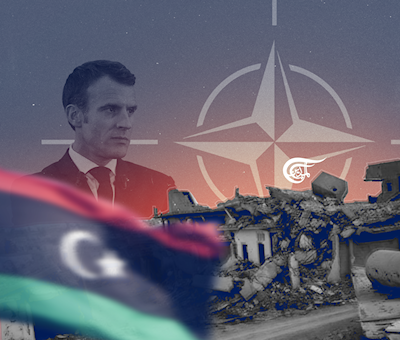NATO needs to be held to account for the destruction of Libya
The French are now posing as peace-makers and upholders of democracy in a catastrophic foreign war they themselves caused in Libya.
On November 12, French President Emmanuel Macron convened an international conference on Libya in Paris. The outcome of that conference was the announcement of a general election on December 24. The French are now posing as peace-makers and upholders of democracy in a catastrophic foreign war they themselves caused. But the weakening of the EU after Brexit and the rise of Turkey as a global power could upset French plans for hegemony in Africa.
In 2011, France led a NATO bombing campaign in Libya which ousted its leader Colonel Gaddafi, plunging Africa’s wealthiest nation into chaos and destruction. On November 2 the previous year, the French had signed a mutual defense treaty with Britain which involved simulated war games against an African country in fulfillment of UN ‘Responsibility-to-protect’ resolutions.
The operation was called Southern Mistral. In March 2011, US Democratic Congressman Denis Kucinich surmised in The Observer whether the French-led war on Libya was simply the war games going live:
‘The “Composite Air Operations” were planned for the period of 21-25 March, 2011. On March 20, 2011, the United States joined France and Great Britain in an air attack against Gaddafi’s Libya, pursuant to UN Security Council resolution 1973.
Have the scheduled war games simply been postponed, or are they actually underway after months of planning, under the name of Operation Odyssey Dawn? Were opposition forces in Libya informed by the US, the UK, or France about the existence of Southern Mistral/Southern Storm, which may have encouraged them to violence leading to greater repression and a humanitarian crisis? In short, was this war against Gaddafi’s Libya planned or a spontaneous response to the great suffering which Gaddafi was visiting upon his opposition?
No one has ever answered these questions. No international inquiry into Mr. Kucinich’s accusations has been held either. His article and the website address proving the plan have since been erased from the internet.
As Saif al-Islam, Muammar Gaddafi’s son, is currently set to run for president against General Khalifa Haftar, the power struggle in Libya is likely to exacerbate geopolitical tensions between several European countries and Turkey, as well as tensions between European countries themselves.
The mess created by NATO in Libya is mirrored by the current diplomatic chaos in the European Union itself. Italy never fully backed the NATO bombing and invasion of Libya in 2011. Former Italian President Silvio Berlusconi indicated that his hands had been tied by NATO.
Italy had previously signed many important trade agreements with its former colony, which would have been mutually beneficial. Tensions between France and Italy over Libya peaked in 2019 when Italian Interior Minister Matteo Salvini accused France of stealing African resources.
The mass protest movement in Italy against the Green Pass is likely to topple the Mario Draghi regime in time. That could bring a populist coalition to power which would prevent European unity on the Libyan question.
Gaddafi and African sovereignty
Colonel Gaddafi had ambitious plans for the African economic and political development -- an African Central Bank, technological independence symbolized by the continent’s Libya-financed first satellite, and most importantly, plans for the introduction of a single gold-backed African currency called the dinar.
The drive for African unity and independence was led by Muammar Gaddafi. Libya’s leadership in Africa was a problem for the French ruling class. They had profited from African underdevelopment through the fraudulent monetary system called the French colonial Frank, whereby the currency of several African states was controlled by French banks. Sarkozy had already bombed and destroyed the Ivory Coast in 2010 after president Laurent Gbagbo threatened to end French economic domination of his country.
As the situation stands now, Franco-Italian disagreements over who should be the chief European power dealing with Libya, Greek-Turkish maritime disputes over territory stretching across the Eastern Mediterranean to Libya, and Russian, Israeli, Egyptian, and Chinese interests in Libya, could all erupt in conflict, not just in Libya, but in other important geopolitical zones.
Turkey and Egypt-KSA-UAE alliance are the real powers in Libya
Until 2020, there were two rival centers of power in Libya: the Government of National Unity in Tripoli under Fayez Al Sarraj, backed by Turkey and Italy, which was officially recognized by the UN but lacked popular support, and the forces loyal to General Khalifa Haftar in the East, backed by France, Russia, "Israel", Egypt, Saudi Arabia, and the United Arab Emirates.
There is a mind-boggling number of geopolitical variables which will determine Libya’s future. Turkey had supported Fayez al-Sarraj’s Government of National Unity based in Tripoli. Ankara says that countries supporting General Haftar’s forces in Benghazi are violating international law, which is rather hypocritical from a government colluding with terrorists in Syria!
The French government’s support for General Haftar is based on oil interests. TOTAL has secured imported concessions in Eastern Libya, which Haftar has protected.
Turkey opposes France’s plan for general elections in December, saying the country is not ready. Qatar and Iran have expressed support for Turkey’s policy in Libya. Although Turkey and Iran are on opposite sides in the Syrian war, Ankara and Tehran share a common interest in opposing Kurdish separatism. Turkey also sees the US-backed Syrian Democratic Forces as a proxy force for Kurdish interests in Syria.
Although China did not oppose the UN resolution which sanctioned the 2011 bombing of Libya, Gaddafi’s propensity to favor Chinese companies over their Western counterparts was another driving force of the war.
Chinese investments in Libya have resumed in recent years. Turkish-Chinese competition for resources in Libya could have a negative impact on China’s Belt and Road Initiative of Eurasian integration. Ankara recently formed the Turkish Union, comprising Turkish-speaking Central Asian states.
Separatism in China’s Xinjiang Province or Eastern Turkestan has been backed by Ankara for a long time. Turkey even accused China of ‘genocide’ for its internment of Uighur Muslims following what China claimed was an attempt by Islamist terrorists to destabilize the country. But Ankara is, nonetheless, pragmatic in its relations with Beijing. The Turks want China to integrate the Belt and Road Initiative with Turkey’s Middle Corridor infrastructure project, making Turkey rather than Greece the principal connector for East-West trade.
Libya is a microcosm of a world where all law and order has broken down. It is an image of our ‘mad max’ future, where imperialist interests and monopoly capitalism deprive the poor of a future. If Saif al-Islam Gaddafi comes to power, will he demand reparations for the war? Will he set up an international criminal tribunal to judge the real perpetrators of the war who are surely guilty of war crimes and crimes against humanity? Would the African Union support such a move? It is highly unlikely.
In 2019, General Haftar’s forces attempted, unsuccessfully, to take control of Tripoli. Turkey sent forces to support the al-Sarraj regime. The December election will achieve nothing if the EU, and in particular, Franco-Turkish, disputes are not resolved. And those disputes go far beyond the geopolitics of North Africa and the Eastern Mediterranean.
France’s recent spat with Australia over their rejection of French submarines in favor of British and American models means that Paris can no longer rely on the Atlantic alliance. Many French elites favor the concept of Eurafrica, an integrated zone incorporating the EU and the African Union, which would counter the Sino-Russian-led Eurasian Union.
But Brexit and the rise of Turkey as a great power with military bases in Sudan, Qatar, and Somalia mean the geopolitical chessboard has changed. Libya is likely to remain a zone of percolating instability, as the countries which plot its destruction, now fight each other for the spoils.
While militarism and monopoly capitalism determine international relations, it is unlikely that this new multipolarity will have a positive effect on ordinary people. Imperial wars are planned in secret, often many years in advance; false pretexts are found to wage them and after millions who died in the chaos that ensues, the imperialists pose as peacemakers.

 Gearóid Ó Colmáin
Gearóid Ó Colmáin
 8 Min Read
8 Min Read












